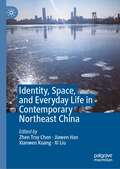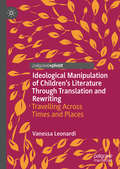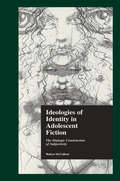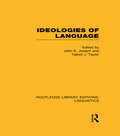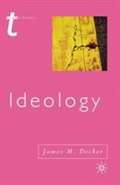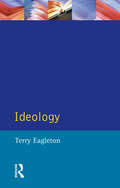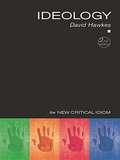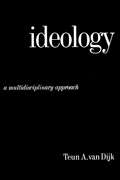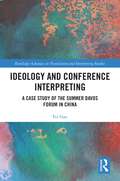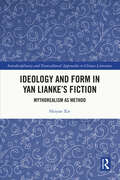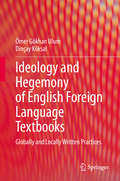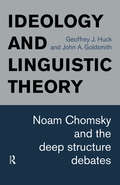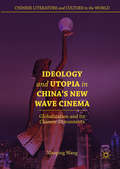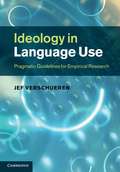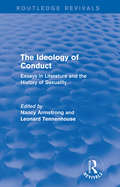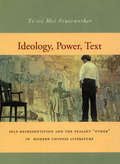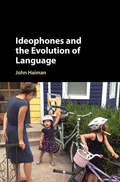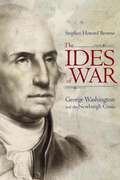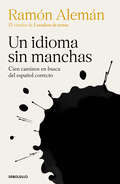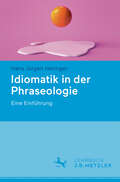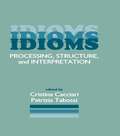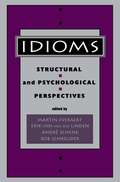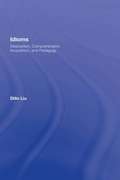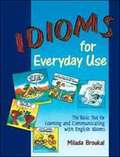- Table View
- List View
Identity, Space, and Everyday Life in Contemporary Northeast China
by Zhen Troy Chen Jiawen Han Xianwen Kuang Xi LiuThis edited volume is first of its kind to document and critically analyse the changes took place snice China’s opening-up and reform and its impact on Dongbei, China’s North-East region, known for its remote and vast landscape, unique and othered culture, rich resources, mighty infrastructures and industries, geopolitical significance. Through presenting up-to-date and multidimensional case studies, the book covers three major aspects of Dongbei, which put people at the heart of our scholarly focus, namely people’s mediated life through traditional and new media; people’s social, cultural, and living spaces; artistic and fictional representations of people’s everyday life.
Ideological Manipulation of Children’s Literature Through Translation and Rewriting: Travelling Across Times and Places
by Vanessa LeonardiThis book explores the topic of ideological manipulation in the translation of children’s literature by addressing several crucial questions, including how target language norms and conventions affect the quality of a translation, how translations are selected on the basis of what is culturally accepted, who is involved in the selection of what should be translated for children in the target culture, and how this process takes place. The author presents different ways of looking at the translation of children’s books, focusing particularly on the practices of intralingual and interlingual translations as a form of rewriting across a selection of European languages. This book will be of interest to Translation Studies and children's literature scholars, as well as those with a wider interest in the impact of ideology on culture.
Ideologies of Identity in Adolescent Fiction: The Dialogic Construction of Subjectivity (Children's Literature and Culture)
by Robyn McCallumIdeologies of Identity in Adolescent Fiction examines the representation of selfhood in adolescent and children's fiction, using a Bakhtinian approach to subjectivity, language, and narrative. The ideological frames within which identities are formed are inextricably bound up with ideas about subjectivity, ideas which pervade and underpin adolescent fictions. Although the humanist subject has been systematically interrogated by recent philosophy and criticism, the question which lies at the heart of fiction for young people is not whether a coherent self exists but what kind of self it is and what are the conditions of its coming into being. Ideologies of Identity in Adolescent Fiction has a double focus: first, the images of selfhood that the fictions offer their readers, especially the interactions between selfhood, social and cultural forces, ideologies, and other selves; and second, the strategies used to structure narrative and to represent subjectivity and intersubjectivity.
Ideologies of Language: Linguistics: Ideologies Of Language (Routledge Library Editions: Linguistics)
by Talbot J. Taylor John E. JosephIs the study of language ideologically neutral? If so, is this study objective and autonomous? One of the most cherished assumptions of modern academic linguistics is that the study of language is, or should be, ideologically neutral. This professed ideological neutrality goes hand-in-hand with claims of scientific objectivity and explanatory autonomy. Ideologies of Language counters these claims and assumptions by demonstrating not only their descriptive inaccuracy but also their conceptual incoherence.
Ideology
by James M. DeckerThis concise introduction to the concept of ideology provides an overview of the term and considers its impact on literary theory. James M. Decker analyzes the history of Western ideology from its pre-Enlightenment roots to its current incarnations, providing readers with both an essential overview of key terms and issues and a thoughtful assessment of some of the important critical thinkers associated with the notion, including Marx, Gramsci and Althusser. Ideological theories are introduced within three broad categories - the subjective, the institutional and the political - which helps students to synthesize a concept that sprawls across the traditional disciplinary lines of philosophy, politics, economics, history and cultural and literary studies. Close readings of key texts demonstrate the impact of ideology on critical practice and literary reputation. Texts include: - Toni Morrison's Sula - William Faulkner's 'Barn Burning' - George Orwell's 1984 Compact and easy-to-follow, Decker's study finally asks: are we now in a 'post-ideological' era?
Ideology (Longman Critical Readers)
by Terry EagletonThis collection of readings on the concept of ideology is brought together by the Marxist critic, Terry Eagleton. His introduction traces the historical evolution of ideology and examines in a more theoretical style the various meanings of the word and their significance. The readings begin with the first English translations of some of the writing of the French founder of the concept in the eighteenth century. They then move from the enlightenment to Hegel and Marxism, with particular emphasis on Marx and Engels themselves. They also look at other eighteenth-century traditions of thought such as Nietzche and Freud. All the readings are theoretical rather than examples of `ideology at work' and will be of interest to undergraduate students of cultural, political and historical studies concerned with ideology, as well as students of English literature.
Ideology (The New Critical Idiom)
by David HawkesAny literary student who is new to the terminology and uses of critical terms will welcome David Hawkes' Ideology, a comprehensive and concise overview. In refreshingly clear and jargon-free prose, Hawkes: * Considers the myriad definitions and meanings of ideology * Traces the history of the term and the debates which surround it, from Martin Luther and Machiavelli to present-day debates in feminism and psychoanalysis * Provides literary examples and illustrations to illuminate and clarify his argument * Asks whether, in the face of post-war capitalism and postmodernism, the ideology debate is obsolete, or is still very much relevant in contemporary debates
Ideology: A Multidisciplinary Approach (Communication Ser.)
by Teun A. Van DijkThe definition of ideology continues to occupy scholars across a wide range of disciplines. In this book, Teun A van Dijk sketches a challenging new multidisciplinary framework for theorizing ideology. He defines ideology as the basis of the social representations of a group, its functions in terms of social relations between groups, and its reproduction as enacted by discourse. Contemporary racist discourse is examined to illustrate these ideological relations between cognition, society and discourse.
Ideology and Conference Interpreting: A Case Study of the Summer Davos Forum in China (Routledge Advances in Translation and Interpreting Studies)
by Fei GaoGao uses the case of conference interpreting at the Summer Davos Forum in China to systematically reveal the ways in which ideology and linguistic ‘re-engineering’ can lead to discourse reconstruction. Translation and interpreting can never be wholly neutral practices in ‘multi-voiced’ transnational communication. Gao employs an innovative methodological synthesis to examine in depth a range of elements surrounding interpreters’ ideological positioning. These include analysing the appraisal patterns of the source and target texts, identifying ‘us’-and-‘them’ discourse structures, investigating interpreters’ cognitions, and examining the crossmodal means by which interpreters render paralanguage. Collectively, they bridge the gap between socio-political and ideological concerns on the one hand, and practical questions of discourse reconstruction in cross-language/ cultural events on the other, offering a panoramic perspective. An invaluable read for scholars in translation and interpreting studies, particularly those with an interest in political discourse or the international relations context.
Ideology and Conference Interpreting: A Case Study of the Summer Davos Forum in China (ISSN)
by Fei GaoGao uses the case of conference interpreting at the Summer Davos Forum in China to systematically reveal the ways in which ideology and linguistic ‘re-engineering’ can lead to discourse reconstruction. Translation and interpreting can never be wholly neutral practices in ‘multi-voiced’ transnational communication. Gao employs an innovative methodological synthesis to examine in depth a range of elements surrounding interpreters’ ideological positioning. These include analysing the appraisal patterns of the source and target texts, identifying ‘us’-and-‘them’ discourse structures, investigating interpreters’ cognitions, and examining the crossmodal means by which interpreters render paralanguage. Collectively, they bridge the gap between socio-political and ideological concerns on the one hand, and practical questions of discourse reconstruction in cross-language/ cultural events on the other, offering a panoramic perspective. An invaluable read for scholars in translation and interpreting studies, particularly those with an interest in political discourse or the international relations context.
Ideology and Form in Yan Lianke’s Fiction: Mythorealism as Method (Interdisciplinary and Transcultural Approaches to Chinese Literature)
by Haiyan XieXie analyzes three novels by the international award-winning Chinese writer Yan Lianke and investigates how his signature “mythorealist” form produces textual meanings that subvert the totalizing reality prescribed by literary realism. The term mythorealism, which Yan coined to describe his own writing style, refers to a set of literary devices that incorporate both Chinese and Western literary elements while remaining primarily grounded in Chinese folk culture and literary tradition. In his use of mythorealism, carrying a burden of social critique that cannot allow itself to become “political,” Yan transcends the temporality and provinciality of immediate social events and transforms his potential socio-political commentaries into more diversified concerns for humanity, existential issues, and spiritual crisis. Xie identifies three modes of mythorealist narrative exemplified in Yan’s three novels: the minjian (folk) mode in Dream of Ding Village, the allusive mode in Ballad, Hymn, Ode, and the enigmatic mode in The Four Books. By positioning itself against an ambiguous articulation of social determinants of historical events that would perhaps be more straightforward in a purely realist text, each mode of mythorealism moves its narrative from the overt politicality of the subject matter to the existential riddle of negotiating an alternative reality. A groundbreaking study of one of contemporary China’s most important authors that will be of great value to scholars and students of Chinese literature.
Ideology and Hegemony of English Foreign Language Textbooks: Globally and Locally Written Practices
by Ömer Gökhan Ulum Dinçay KöksalThis volume investigates ideological and hegemonic practices in globally and locally written English as a Foreign Language (EFL) textbooks, and explores whether these textbooks reflect the values, beliefs and norms of the native-speaker society by examining their ideological components and the hegemonic practices by means of which the source society or state seeks to influence learners of the language. It also attempts to clarify EFL teachers’ and students’ views on the underlying ideology and hegemonic practices in globally and locally written EFL textbooks. Studies on the relationship between ideology, hegemony and textbooks in applied linguistics have become more prevalent in recent decades, as the emergence of critical theory, critical pedagogy, and critical thinking skills from the 1920s onwards has led scholars to adopt a more critical perspective towards EFL textbooks, especially with regard to elements of ideology and hegemony. These two terms encompass a plethora of components, ranging from nationalism to religion. At the same time, the importance of metanarratives originating from the tenets of modernism has declined from the 1960s onwards, the assumption being that the world has entered a new age called postmodernism and post-structuralism that emphasizes the role of individuals and rejects efforts to reinforce post-colonialism, the effects of which can be seen in EFL textbooks. Accordingly, taking the elements of ideology and hegemony into account remains a vital aspect in the analysis of EFL textbooks.
Ideology and Linguistic Theory: Noam Chomsky and the Deep Structure Debates (History of Linguistic Thought)
by John A. Goldsmith Geoffrey J. HuckIn The Ideological Structure of Linguistic Theory Geoffrey J. Huck and John A. Goldsmith provide a revisionist account of the development of ideas about semantics in modern theories of language, focusing particularly on Chomsky's very public rift with the Generative Semanticists about the concept of Deep Structure.
Ideology and Utopia in China's New Wave Cinema: Globalization And Its Chinese Discontents (Chinese Literature And Culture In The World Ser.)
by Xiaoping WangIdeology and Utopia in China’s New Wave Cinema investigates the ways in which New Wave filmmakers represent China in this age of neoliberal reform. Analyzing this paradigm shift in independent cinema, this text explores the historicity of the cinematic form and its cultural-political visions. Through a close reading of the narrative strategy of key films in New Wave Cinema, Xiaoping Wang studies the movement’s impact on film, literature, culture and politics.
Ideology in Language Use
by Jef VerschuerenThe relationship between language and ideology has long been central to research in discourse analysis, pragmatics, sociolinguistics and linguistic anthropology, and has also informed other fields such as sociology and literary criticism. This book, by one of the world's leading pragmatists, introduces a new framework for the study of ideology in written language, using the tools, methods and theories of pragmatics and discourse analysis. Illustrations are drawn systematically from a coherent corpus of excerpts from late nineteenth- and early twentieth-century history textbooks dealing with episodes of colonial history and in particular the 1857 'Indian Mutiny'. It includes the complete corpus of excerpts, allowing researchers and students to evaluate all illustrations; at the same time, it provides useful practice and training materials. The book is intended as a teaching tool in language-, discourse- and communication-oriented programs, but also for historians and social and political scientists.
The Ideology of Conduct: Essays in Literature and the History of Sexuality (Routledge Revivals)
by Nancy Armstrong Leonard TennenhouseIn The Ideology of Conduct, first published in 1987, scholars from various fields, from the medieval period to the present day, discuss literature in which the sole purpose is to instruct women in how to make themselves desirable. This collection investigates how middle-class writers who had long emulated the behaviour of the aristocracy began to criticise that behaviour by formulating an alternative object of desire. They did so without appearing to breed political controversy because it seemed to concern only the female. But writing for and about women in fact became a powerful instrument of hegemony as it introduced a whole new vocabulary for social relations, induced certain forms of economic behaviour as desirable in men and women respectively, and insured the reproduction of the nuclear family. It is argued, therefore, that the literature of conduct not only recorded but also assisted the production of our contemporary gender-based culture.
Ideology, Power, Text: Self-Representation and the Peasant ‘Other’ in Modern Chinese Literature
by Yi-tsi Mei FeuerwerkerThe division between the scholar-gentry class and the “people” was an enduring theme of the traditional Chinese agrarian-bureaucratic state. Twentieth-century elites recast this as a division between intellectuals and peasants and made the confrontation between the writing/intellectual self and the peasant “other” a central concern of literature. The author argues that, in the process, they created the “peasantry,” the downtrodden rural masses represented as proper objects of political action and shifting ideological agendas. Throughout this transition, language or discourse has been not only a weapon of struggle but the center of controversy and contention. Because of this primacy of language, the author’s main approach is the close reading or, rather, re-reading of significant narrative fictions from four literary generations to demonstrate how historical, ideological, and cultural issues are absorbed, articulated, and debated within the text. Three chapters each focus on one representative author. The fiction of Lu Xun (1881-1936), which initiated the literary preoccupation with the victimized peasant, is also about the identity crisis of the intellectual. Zhao Shuli (1906-1970), upheld by the Communist Party as a model “peasant writer,” tragically exemplifies in his career the inherent contradictions of such an assigned role. In the post-Mao era, Gao Xiaosheng (1928—) uses the ironic play of language to present a more ambiguous peasant while deflating intellectual pretensions. The chapter on the last of the four “generations” examines several texts by Mo Yan (1956—), Han Shaogong (1952—), and Wang Anyi (1954—) as examples of “root-searching” fiction from the mid-1980’s. While reaching back into the past, this fiction is paradoxically also experimental in technique: the encounter with the peasant leads to questions about the self-construction of the intellectual and the nature of narrative representation itself. Throughout, the focus is on texts in which some sort of representation or stand-in of the writer/intellectual self is present—as character, as witness, as center of consciousness, or as first-person or obtrusive narrator. Each story catches the writer in a self-reflective mode, the confrontation with the peasant “other” providing a theater for acting out varying dramas of identity, power, ideology, political engagement, and self-representation.
Ideophones and the Evolution of Language
by John HaimanIdeophones have been recognized in modern linguistics at least since 1935, but they still lie far outside the concerns of mainstream (Western) linguistic debate, in part because they are most richly attested in relatively unstudied (often unwritten) languages. The evolution of language, on the other hand, has recently become a fashionable topic, but all speculations so far have been almost totally data-free. Without disputing the tenet that there are no primitive languages, this book argues that ideophones may be an atavistic throwback to an earlier stage of communication, where sounds and gestures were paired in what can justifiably be called a 'prelinguistic' fashion. The structure of ideophones may also provide answers to deeper questions, among them how communicative gestures may themselves have emerged from practical actions. Moreover, their current distribution and behaviour provide hints as to how they may have become conventional words in languages with conventional rules.
The Ides of War: George Washington and the Newburgh Crisis (Studies in Rhetoric & Communication)
by Stephen Howard BrowneA history and analysis of how George Washington stopped an attempted military coup at the end of the American Revolutionary War.History tells us that on a day when the forces of civil government confront the forces of military might, no one knows what may follow. Americans believe that they have avoided this moment, that whatever other challenges the country has faced, at least it never has had to deal with the prospects of a coup d’état. Stephen Howard Browne maintains that this view is mistaken, that in fact the United States faced such a crisis, at the very moment when the country announced its arrival on the world scene in the spring of 1783 in a rustic meeting hall along the Hudson River near Newburgh, New York. The crisis was resolved by George Washington, commander in chief of the US Army, in an address he delivered to a roomful of restive and deeply disaffected officers.In The Ides of War, Browne examines the resolution of the first confrontation between the forces of American civil government and the American military—the Newburgh Crisis. He tells the story of what transpired on that day, examines what was said, and suggests what we might learn from the affair. Browne shows that George Washington’s Newburgh Address is a stunning example of the power of human agency to broker one of our most persistent, most troublesome dilemmas: the rival claims to power of civil and military authorities. At stake in this story are biding questions about the meaning and legacy of revolution, the nature of republican government, and ultimately what kind of people we are and profess to be.Browne holds that although these are monolithic and vexed themes, they are vital and need to be confronted to obtain a coherent and convincing account of history. The Newburgh Crisis offers an unmatched opportunity to examine these themes, as well as the role of rhetoric in the founding of the world’s first modern republic.“Few speeches have shaped the course of American history more than George Washington’s address to his potentially mutinous officers in Newburgh, New York, on March 15, 1783. In this splendid book, Browne deftly brings to life the Newburgh conspiracy, Washington’s masterful response to it, and the lasting implications of both for civil-military relations in a republican government.” —Stephen Lucas, Evjue-Bascom Professor in the Humanities, University of Wisconsin“This elegant and persuasive book expands our knowledge of a little known but hugely significant turning point in American history, one that set it on course toward liberty and democracy. In the process, Browne brings new understanding to the founding of the United States, its military system, and its first commander in chief.” —Richard H. Kohn, professor emeritus of history and peace, war, and defense, University of North Carolina at Chapel Hill
Un idioma sin manchas: Cien caminos en busca del español correcto
by Ramón Alemán100 curiosidades sobre la lengua española que contagian entusiasmo y amor por un idioma que puede ser hermosamente complejo Ramón Alemán, corrector de textos y periodista con décadas de experiencia, nos trae en este libro una guía práctica para mejorar el uso de nuestro idioma a través de anécdotas y ejemplos explicados con rigor, humor y sencillez. En estas páginas, responde a las dudas que nos surgen en el día a día como hispanohablantes y nos trae la sabiduría de los grandes conocedores y expertos del español. Así, los misterios de la gramática y la ortografía se desvelan sin esfuerzo, y antes de que nos demos cuenta han quedado resueltos.
Idiomatik in der Phraseologie: Eine Einführung
by Hans Jürgen HeringerRedensarten, Floskeln und Geflügelte Worte sind essentieller Bestandteil der deutschen Sprache. Die Einführung behandelt auf Basis empirischer und korpusbasierter Erkenntnisse so anschaulich wie unterhaltsam verschiedene Typen von Idiomen, diskutiert lexikographische Fragen, Verwendungsweisen, Übersetzungs- und Verstehensprobleme sowie sprachhistorische Entwicklungen. Mit vielen Beispielen und Aufgaben für das Selbststudium ist das Buch ideal für die erste Auseinandersetzung mit dem Thema und besonders für das Bachelor-Studium zu empfehlen.
Idioms: Processing, Structure, and Interpretation
by Cristina Cacciari Patrizia Tabossi"The book draws on a lot of research, is friendly to the reader, and will be of good value to teachers." Paul Nation, Victoria University of Wellington, Australia This comprehensive, up-to-date, and accessible text on idiom use, learning, and teaching approaches the topic with a balance of sound theory and extensive research in cognitive linguistics, psycholinguistics, corpus linguistics, and sociolinguistics combined with informed teaching practices. Idioms is organized in three parts: Part I includes discussion of idiom definition, classification, usage patterns, and functions. Part II investigates the process involved in the comprehension of idioms and the factors that influence individuals’ understanding and use of idioms in both L1 and L2. Part III explores idiom acquisition and the teaching and learning of idioms, focusing especially on the strategies and techniques used to help students learn idioms. To assist the reader in grasping the key issues, study questions are provided at the end of each chapter. The text also includes a glossary of special terms and an annotated list of selective idiom reference books and student textbooks. Idioms is designed to serve either as a textbook for ESL/applied linguistics teacher education courses or as a reference book. No matter how the book is used, it will equip an ESL/applied linguistics students and professionals with a solid understanding of various issues related to idioms and the learning of them.
Idioms: Structural and Psychological Perspectives
by Martin Everaert Erik-Jan van der Linden André Rob SchreuderIdioms have always aroused the curiosity of linguists and there is a long tradition in the study of idioms, especially within the fields of lexicology and lexicography. Without denying the importance of this tradition, this volume presents an overview of recent idiom research outside the immediate domain of lexicology/lexicography. The chapters address the status of idioms in recent formal and experimental linguistic theorizing. Interdisciplinary in scope, the contributions are written by psycholinguists and theoretical and computational linguists who take mutual advantage of progress in all disciplines. Linguists supply the facts and analyses psycholinguists base their models and experiments on; psycholinguists in turn confront linguistic models with psycholinguistic findings. Computational linguists build natural language processing systems on the basis of models and frameworks provided by theoretical linguists and, sometimes psycholinguists, and set up large corpora to test linguistic hypotheses. Besides the fascination for idioms that make up such a large part of our knowledge of language, interdisciplinarity is one of the attractions of investigations in idiomatic language and language processing.
Idioms: Description, Comprehension, Acquisition, and Pedagogy (ESL & Applied Linguistics Professional Series)
by Dilin LiuThis comprehensive, up-to-date, and accessible text on idiom use, learning, and teaching approaches the topic with a balance of sound theory and extensive research in cognitive linguistics, psycholinguistics, corpus linguistics, and sociolinguistics combined with informed teaching practices. Idioms is organized into three parts: Part I includes discussion of idiom definition, classification, usage patterns, and functions. Part II investigates the process involved in the comprehension of idioms and the factors that influence individuals’ understanding and use of idioms in both L1 and L2. Part III explores idiom acquisition and the teaching and learning of idioms, focusing especially on the strategies and techniques used to help students learn idioms. To assist the reader in grasping the key issues, study questions are provided at the end of each chapter. The text also includes a glossary of special terms and an annotated list of selective idiom reference books and student textbooks. Idioms is designed to serve either as a textbook for ESL/applied linguistics teacher education courses or as a reference book. No matter how the book is used, it will equip ESL/applied linguistics students and professionals with a solid understanding of various issues related to idioms and the learning of them.
Idioms for Everyday Use: The Basic Text For Learning And Communicating With English Idioms
by Milada BroukalOver 230 commonly used idioms are introduced in reading selections, dialogues, and activities. Their presentation helps learners incorporate common expressions into their everyday speech. Appealing illustrations keep students engaged as they explore idioms related to topics such as colors, geography, food, and time.
